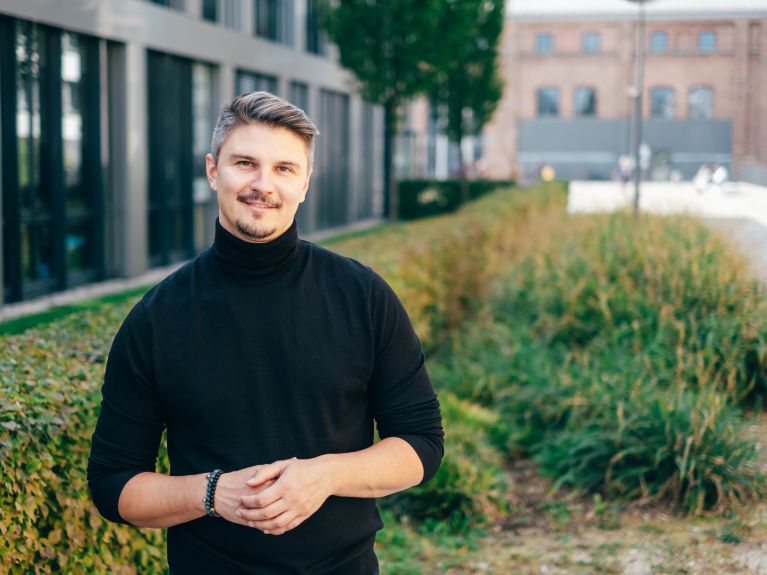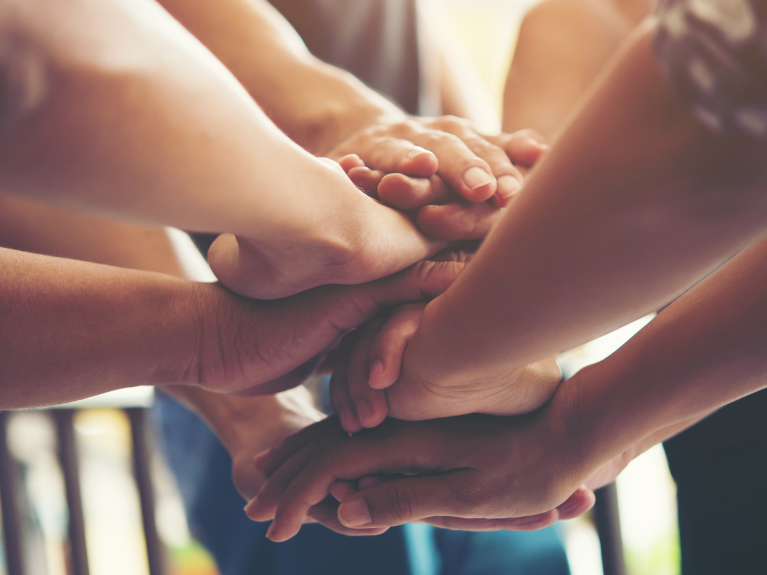Supporting people through mentoring
Pavlo Stroblja is from Ukraine – and provides people with valuable support in their professional lives with his Queermentor project.

In 2022, the Queermentor project won the German “Impact of Diversity Award”. It was founded by Pavlo Stroblja from Ukraine, who now lives in Heidelberg. Being “the first digital training and empowerment platform for the LGBTIQA community and allies,” Queermentor wants to help make the world of work more diverse by providing free services such as coaching and training – and above all a comprehensive mentoring programme. Around 170 mentors support young queer people in their personal and professional development.
Mr Stroblja, what motivates you to support others with your Queermentor project?
The main reason for launching the project in 2021 was that there was simply no comparable service on offer for the LGBTIQA community. I also knew from conversations with straight allies, that is to say heterosexuals who support the LGBTIQA movement, that they were looking for ways to do something for the community. In other words, we bring those who need support together with all kinds of different people with the qualifications and expertise to help them. Queermentor is the ideal platform for connecting people and making possible different types of empowerment. In addition, a key factor in founding Queermentor for me was my own personal motivation.
What gave rise to this motivation?
I came to Germany to study nearly 20 years ago, at the age of 22. It was not until I arrived in Germany that I was able to come out. In Ukraine I had no role models to show me that it is okay to be yourself and to stand up for yourself. Instead, I was forced to adapt. Through Queermentor, I want to give young people, no matter where they come from or what their background is, the courage to be themselves and to find role models. And to make this as straightforward for them as possible so that they can find their place in the world as quickly as possible and receive the support they need.

How does Queermentor work?
Because so many members of the LGBTIQA community experience social exclusion, we want to convey a very clear message to them, namely that you are absolutely fine the way you are. The issues faced by the people who come to us are as diverse as they are themselves. Our mentors support them with their coming out, be it in the family or at work; they support the mentees during the application process and when searching for an employer that will suit them. An orientation chat with us often reveals other issues that the mentors can help with. Many apprentices and trainees, students and those starting out in their professional lives want to be more self-confident and feel more comfortable with their own sexual orientation. At the same time, it is important for them to be helped with their professional orientation and opportunities for planning a career.
Do you also have mentees with professional experience?
Yes, and they are even easier for us to reach because they already have a clearer understanding of what mentoring means. They know how important it can be to have someone by your side to support you in the world of work – for example if you wish to switch to a different job or sector. Incidentally, we have mentors from around 20 different branches of industry, such as the automotive sector, the banking industry and finance, or HR. Furthermore, Queermentor is also about a sense of community and belonging, which is not restricted to any one particular generation and which we seek to strengthen by providing various services.
How international is Queermentor?
It was very important to me to make Queermentor as inclusive as possible, and to have a platform that would not only be digital and thus accessible from any location, but also in English so as to provide information to people around the world. Most of our mentors are multilingual, and many live outside Germany, for example in Ireland, the USA, Malta or France. As far as internationality goes, it is also ideal that the services offered by Queermentor are very scalable and can be reproduced relatively easily in other countries. I could even imagine this happening one day in Ukraine.
What is your take on the war in Ukraine?
The last time I visited my parents in Ukraine before the war was for New Year’s Eve. The Russian attack at the end of February initially came as a shock. But then I started offering and organising help for Ukrainian refugees. I was also able to bring my parents to Germany and put them up in Heidelberg. I have been in Ukraine repeatedly since March, and am in contact with the queer community there. At Queermentor we are working on offering services to refugees, though naturally we are reliant on donations. Supporting and processing Ukrainian applicants is a very pressing issue just now.

